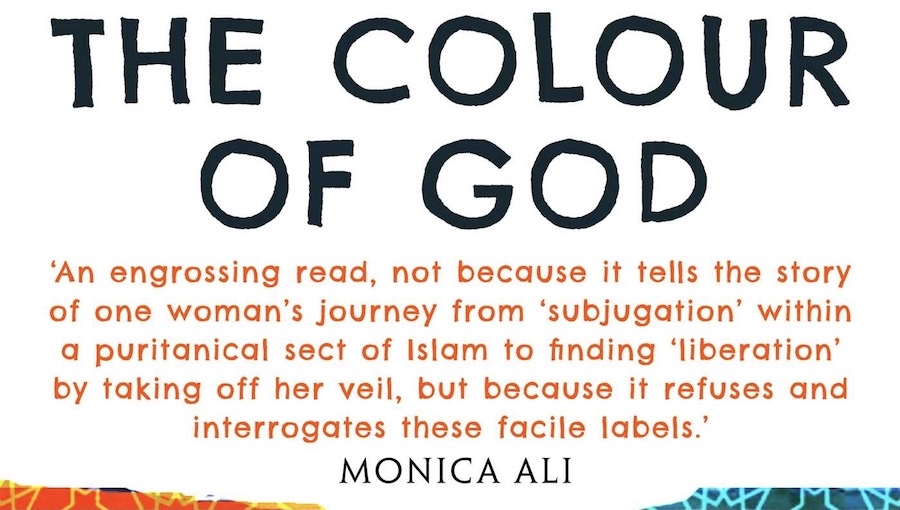The following is an interview with author Ayesha S. Chaudhry regarding the upcoming release of her memoir, The Colour of God: A Story of Family and Faith, through Oneworld Publications. In this interview, Fanbase Press Editor-in-Chief Barbra Dillon chats with Chaudhry about her creative process in sharing so much of her own story, what she hopes that readers will take away from her experiences, and more!
Barbra Dillon, Fanbase Press Editor-in-Chief: Congratulations on the upcoming release of your memoir! What inspired you to share your story with readers?
Ayesha S. Chaudhry: Thank you! I never intended to write this book. I began writing it, quite accidentally, in September of 2015, while I was on a fellowship at the Radcliffe Institute for Advanced Study at Harvard University. The fellowship allowed me to spend a year focused on research and writing, away from all the other commitments of my regular life. During the first month that I was there, I found myself on a sunny patio, in the fall sun, writing what would become the first chapter of the book. It came out of me rather unexpectedly, spontaneously, and it felt like that — that it came out of me, rather than that I intended it or that it was pre-formed as some kind of cerebral activity. Once I’d written the first essay, I realized I probably needed to continue writing. It was crucial that those with whom I shared the first writing encouraged me to keep going.
One of the things that inspired me to publish the book was coming to understand how important it is to have our stories out there. Especially stories that are not normative, that follow the standard narrative, that disappear unless we tell them. Especially for marginalized communities, stories are how we survive. Stories are how we build an archive of ourselves.
BD: What can you share with us about your creative process, and did you find there to be unexpected challenges or surprises in sharing so much of your own voice and experiences in the book?
ASC: Good question. I think audience was one of my biggest and most persistent challenges. I really wanted to write the book in my own voice, to let it be a reflection of the voice in my head, which is a voice we are so often encouraged to censor. And, as a brown woman, I’ve been instructed to keep a lid on this voice all my life, I’ve been taught that no one wants to hear it. But of course, that is not true. Some people do want to hear this voice, while others don’t. So, the question is, who do we write to? The ones who want to hear what we are saying, or the ones who don’t and will find ways to undermine or undervalue what we say because they’re not interested to begin with? Allowing my own light to shine in my writing meant letting the ears of a loving, compassionate, caring reader take precedence, to allow myself to be in conversation with such a reader while working really hard to ignore the unkind, the judgmental, the uncaring gaze.
BD: At Fanbase Press, our #StoriesMatter initiative endeavors to highlight the impact that stories can have on audiences of various mediums. How do you feel that The Colour of God will connect with and impact readers?
ASC: I’m curious about this connection, too. I’m curious to see how the book will resonate with people, what it brings up for them, what they see in it, how they connect to it. I’ve experienced this with my other writing, too, that once you write something and put it out into the world, it really does take on a life of its own and does completely unexpected things. And whether I’m thrilled or horrified at how someone interprets the writing, it is always interesting to see, as a writer.
In its essence, this book is a non-linear story about grief, love, and belonging in a diaspora created by colonialism. Through a series of stories, I explore the ways we try to belong, to find home, to feel whole, and the kinds of violence that accompany so many forms of belonging. I try to think compassionately and critically about family, religion, nationalism, capitalism, patriarchy, and race, among other things. In this way, it explores universal themes and I hope it will appeal to a wide range of people.
BD: What makes Oneworld Publications the perfect home for your book?
ASC: Oneworld understood this book like no one else. The press is really neat – it was founded by a couple Novin Doostdar and Julie Mabey. They have a strong list in scholarship on Islam and are very well respected in the field of Islamic Studies. At the same time, they are an award-winning press for fiction and non-fiction works. They are known for publishing really interesting experimental, genre crossing books. So, they were the perfect press for this book, which crosses genres – it is memoir and personal essay and embodied theory all at once.
BD: Are there any upcoming projects on which you are currently working that you would like to share with our readers?
ASC: I’m currently working on a book called The Little Red One. The book is a sort of lyric biography of A’isha (the Prophet’s wife), my mother and myself rolled into one. The essays in the book explore and expand our notions of belonging and community.
BD: Lastly, what is the best way for our readers to find more information about The Colour of God and your other work?
ASC: They can check out my website at ayeshaschaudhry.com.

